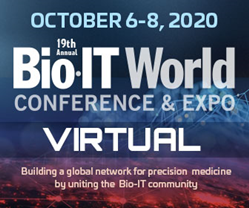
Bio-IT World Conference & Expo Virtual
October 6-8, 2020
And for the first time ever, many presentations will be available on demand after their first showing. Attendees will be able to learn more, ask more questions, and derive more value from the program for weeks and months to come.
BOSTON (PRWEB)
September 16, 2020
Bio-IT World Conference & Expo Virtual kicks off on October 6th, 2020. The program this year includes three days full of content, networking, and interaction across 16 tracks, plenary session, workshops, posters, awards, and happy hours. The virtual meeting platform offers integrated tools to stay connected with colleagues, reach out to speakers, ask questions during presentations and live Q&A panels, and tour virtual exhibit booths.
And for the first time ever, many presentations will be available on demand after their first showing. Attendees will be able to learn more, ask more questions, and derive more value from the program for weeks and months to come.
We are already busy marking our agendas—notations we’ll be able to transfer to the virtual platform soon. Here’s some of what is our on current list.—The Editors
As usual, the event kicks off with workshops designed to be instructional, interactive and in-depth. This year topics include data management for biologics, a crash course in AI, data science-informed decisions, data at scale, and more.
The 2020 Bio-IT World plenary program is exceptional. Susan Gregurick, NIH’s Office of Data Science Strategy, and Rebecca Baker, Director, HEAL, will share NIH’s strategic vision for data science, and how the the pandemic will shape NIH’s future. Tuesday, October 6
Robert Green, Brigham & Women’s Hospital and Harvard Medical School will share fascinating news on his latest sequencing project. And Natalija Jovanovic, Sanofi Pasteur, will share pharma’s view of the AI-enabled future. Thursday, October 8
A panel of experts including Seth Cooper, Northeastern University; Lee Lancashire, Cohen Veterans Bioscience; Pietro Michelucci, Human Computation Institute; and Jérôme Waldispühl, McGill University will tackle how AI, citizen science, and human computation are working together with the help of gaming. Wednesday, October 7
Rare disease patients suffer too often from long diagnostic delays and misidentified diseases. This creates a significant burden, not just for patients, but for healthcare systems. Tom Defay, Alexion, will share examples of collaboration with researchers and hospital systems to develop novel approaches for rare disease patient identification using tools like genomics, machine learning, and NLP. Thursday, October 8
Biomedical research over the last decade has become increasingly complex, and different disciplinary experts are needed to solve challenging scientific questions. No longer is a single disciplinary perspective enough for truly breakthrough research advances. L. Michelle Bennett, NIH NCI, explores how to build the most impactful interdisciplinary teams and how to keep them working effectively. (For more, see our conversation with Michelle at Training Scientists For Our Interdisciplinary Future.) Wednesday, October 7
John Quackenbush, Harvard Medical School, will outline how his group uses networks to understand genetic and genomic drivers of disease. By using innovative computational methods built around network representations of biological interactions, we can gain insight into the disease process, develop predictive biomarkers, and identify possible avenues of therapeutic intervention, he argues. Wednesday, October 7
Alexander Sherman, Massachusetts General Hospital, will describe how MGH is pursuing patient centricity to bring such information together and bridge clinical trials data with RWD, such as data from EHRs, DNA sequences, image banks, biobanks, -omics, etc. We are introducing patient-centric approaches with a unique secure patient identification and aligning incentives for all players in a research continuum, including academia, industry, government, patient advocates, and patients. Wednesday, October 7
Matthew Trunnell, Data Commoner-at-Large (former Vice President and Chief Data Officer, Fred Hutchinson Cancer Research Center) will present the Cascadia Data Discovery Initiative, and its goal to accelerate health innovation and cancer research through collaboration, data sharing, and data-driven research. Wednesday, October 7
Many critical facts required by healthcare AI applications are locked in unstructured free-text data. Recent advances in deep learning have raised the bar on achievable accuracy for tasks, like named entity recognition, entity resolution, de-identification and others, using novel healthcare-specific networks and models. Vishakha Sharma, Roche Molecular Systems, will discuss how Roche applies the greatest advances in AI for healthcare to extract clinical facts from pathology reports and radiology. She will then detail the design of the deep learning pipelines used to simplify training, optimization, and inference of such domain-specific models at scale. Wednesday, October 7
Digital transformation is still a driving principle in pharma R&D with the ultimate goal being to streamline processes and enable precision medicine. Anastasia Christianson, Janssen Pharmaceuticals, will present examples of digital technologies driving transformation and tangible results in R&D. Wednesday, October 7
In a pair of talks from Bristol-Myers Squibb speakers, Ajay Shah and Albert Wang will present Sage, a comprehensive platform for innovation with data and how BMS researchers use Sage to maximize real-world assets. Shah will start by giving an overview of essential components of the platform, such as uniform high-quality data ingestion, data lake enhancement with semantic integration conformance of data, and a reproducible research framework. Wang will highlight how Sage catalogs, models, integrates, conforms, and presents patient-level metadata across all RWD assets to facilitate downstream cross-dataset analysis within an integrated managed analytics environment. This talk will touch on the business drivers for this initiative, our current progress, as well as some lessons learned. Wednesday, October 7

